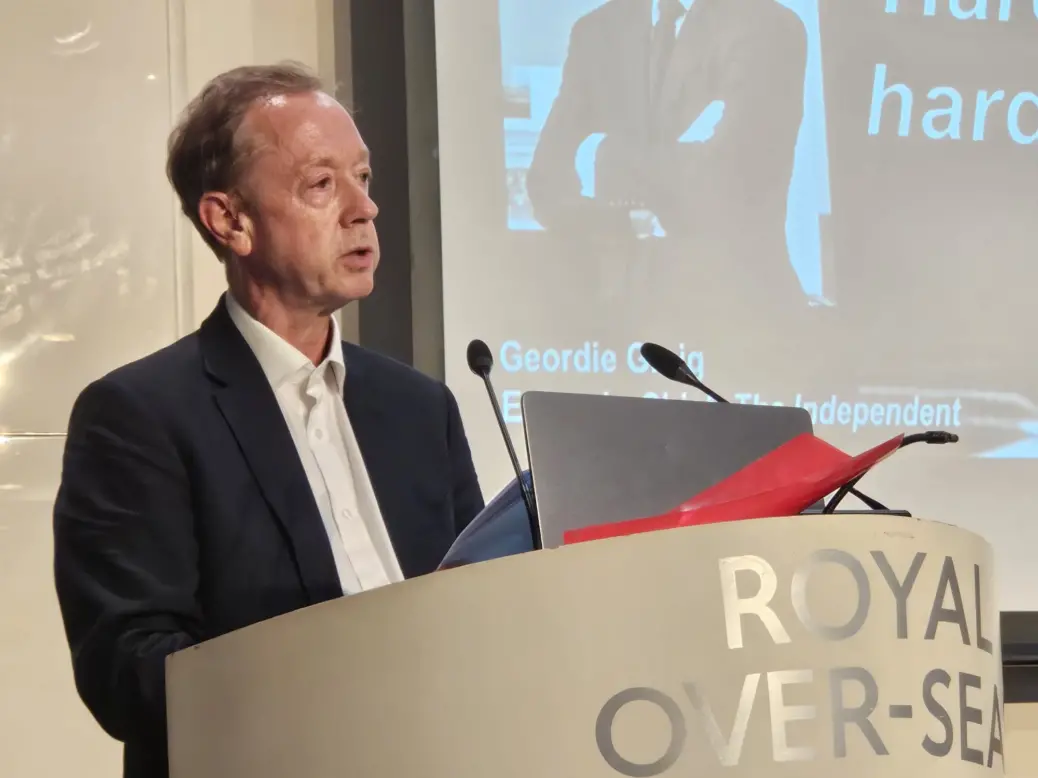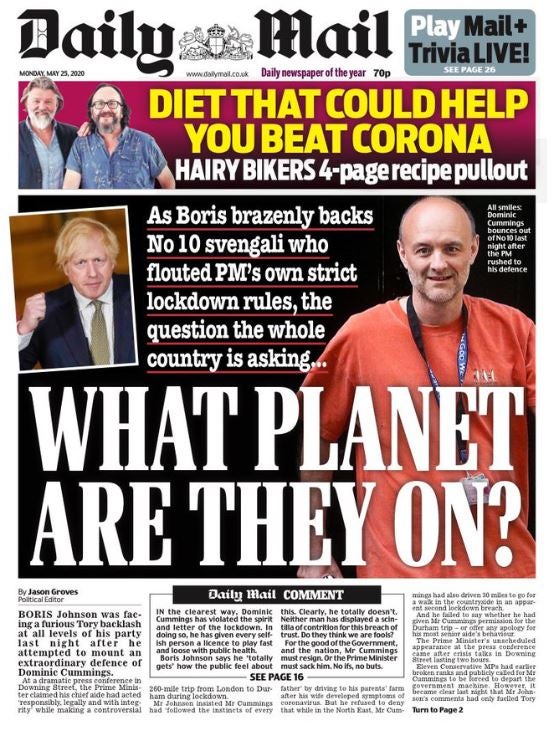
Former Daily Mail editor Geordie Greig has suggested coverage of Tory sleaze saw him get sacked and said his former title subsequently “wallpapered over” government scandals.
Delivering the annual Hugh Cudlipp Lecture last night at an event organised by the London Press Club, Independent editor-in-chief Greig also spoke about the decline in trust in UK journalism and suggested partisan newspaper coverage was partly to blame.
According to a Reuters Institute annual survey, the proportion of Britons saying they trust the news most of the time fell from 51% in 2015 to 33% last year, rising to 36% this year.
Greig said: “I was struck by one of the central findings of Sir John [Curtice]’s report for the National Centre for Social Research. He said disillusionment over Brexit among Leave voters was one of the main reasons for the collapse in trust.
“Which leads me to this question as we are almost certainly about to see a Labour government win power: Did parts of the Tory press in Britain exacerbate the problems of the Tory party by losing perspective and being too partisan?”
He added: “There is a long tradition in British newspapers of taking a political stance, supporting one party or another. This is perfectly reasonable. But it is never reasonable to bury sleaze and incompetence.”
When the referendum on Britain leaving the EU was called in 2016, Greig, who was then Mail on Sunday editor, said he was asked by the title’s owner what position he intended to take: “I told him I was in favour of staying in the EU. Lord Rothermere’s reply was short: ‘OK.’
“I supported the Remain campaign vigorously – but we reported both sides of the argument and we certainly did not vilify those campaigning on the other side.
“The Mail on Sunday’s sister paper, the Daily Mail, shall we say… took a different view of Brexit. No one could question that. But its coverage of contentious slogans on red buses? Claims that it would solve all our immigration problems? Pillorying those who disagreed with them? That can be questioned.”
After Greig succeeded Paul Dacre as editor of the Daily Mail in 2018, the paper changed its editorial stance. In 2020 it ran a front-page story asking “What planet are they on?” when prime minister Boris Johnson backed his chief of staff Dominic Cummings despite the latter breaching coronavirus lockdown rules.

In 2021 the Daily Mail ran front-page stories on “Wallpapergate” about the funding of a lavish Number Ten refurbishment. And it questioned what Greig described as the “inappropriate influence of Johnson’s wife or what some inside No 10 saw as simply meddling”.
Greig’s Mail was praised for its coverage of a scandal involving former Conservative minister Owen Paterson who was accused of lobbying on behalf of two companies who had paid him more than £500,000.
Geordie Greig take a bow, Daily Mail’s six pages on Owen Paterson corruption scandal is superb, two spreads, two columns, a leader; skewers Whittingdale too, a man who attacks BBC to please press backers. pic.twitter.com/JHPq7CsAEM
— David Yelland (@davidyelland) November 4, 2021
Greig hinted that a Daily Mail story published in November 2021 headlined: “Sleaze is back”, which reported on a poll that found Boris Johnson’s administration was seen as the sleaziest in 40 years, may have cost him his job.
Greig said: “A week after that, a cabinet minister said to a trusted friend of mine: ‘The Tory sleaze article was the last straw. We could not have any more of that.’
“Two weeks later I was sacked. Of course, it could all have been a coincidence.
“Eight months later, Johnson resigned as PM. Even his powerful friends in the media couldn’t save him.”
From ‘hell’ to ‘heaven’ for coverage of Tories in Daily Mail
Greig noted that former BBC media editor Amol Rajan said the Daily Mail had given the Tories “hell” under Greig.
The Independent editor said: “The moment my tenure ended, Johnson could be forgiven for thinking he’d gone to heaven. The paper downplayed the scandals that eventually forced him to resign. You might say they wallpapered over them.”
Noting that the Daily Mail and Telegraph went on to support Liz Truss in her bid to be Tory leader, he said: “Her calamitous budget was greeted by her supporters in the commentariat as a triumph, with one enthusing it was ‘the best budget I have ever heard a chancellor deliver’ [Sunday Telegraph editor Allister Heath].”
And he recalled that the Daily Mail front page said: “At Last A True Tory Budget.”
He said: “Millions of ordinary people weren’t dreaming when the economy crashed, interest and mortgage rates shot up and pension funds plunged.
“Homeowners, people who had worked and saved hard for their retirement – the very people Conservative newspapers claim to stand for – thrown to the wolves.”
And, referencing a Daily Mail front page under his predecessor Paul Dacre in 2016 which branded three judges “enemies of the people” for saying Parliament should have the final say on Britain leaving the EU he said: “Not enemies of the people exactly, but perhaps enemies of accurate, prescient journalism?”
He added: “When Truss stood for leader, the right-wing papers collectively said: ’If the Conservative Party doesn’t unite behind Truss, oblivion beckons.’
“The Conservative Party did unite behind her – and now appears to be facing oblivion.”
Asked afterwards by Press Gazette what editors should do in order to restore faith in the profession of journalism, Grieg said: “All of us have to take what we do unbelievably seriously. It’s back to what I learned as a reporter ‘getting bollocked for getting something wrong’, being fair, writing it plain, not distorting, checking. That sense of keeping news and views separate.
“That can often lead to a confusion for some people about what a newspaper is meant to do on its front page or even page 48 of sport.”
Editing The Independent: ‘We monetise quality digital journalism’
Greig was made editor of The Independent in January 2022 and proudly spoke about the formula that has seen it remain in profit every year since it closed its print edition in 2016.
“Every morning, I speak first thing to our audience team in India, where we have an office with 20 staff. They monitor global interest. The Delhi team hand over to London, who then hand on to New York and then LA, 24/7 we are a global brand with unstoppable ambition.
“We combine quality – news, judgment and great writing – with eyeballs, gauging what readers want to know.
“We monetise quality digital journalism as a global publisher.”
He noted that whereas The Guardian has more than 1,000 editorial staff, The Independent has around 200 so it has to be “nimble”.
“The other day, we were inadvertently helped by a rival newspaper [the Daily Telegraph] which sent an email letter to subscribers in which the paper had an interview with the leading pollster. We spotted that John Curtice had said the Tories’ Achilles’ heel was the terrible record of Johnson and Truss. Clearly a good story. Except there was no story – the paper had not written it up.
“So we did, quickly, and had it up and running as our splash before anyone had published a story on this. We scooped a rival on their own scoop!”
“But what happened next was even more telling for two reasons.
“First, the paper did eventually report the interview. However, it skated over the Johnson and Truss angle. When your political agenda means you bury your own scoops, something is wrong.
“Second, it showed that an alert agile online-only newspaper, free of the deadweight of dogma, can beat others at their own game.”
Greig said he was proud of the paper exposing former chancellor Nadhim Zahawi’s tax affairs in 2022 despite legal threats and he noted The Independent’s campaign which secured asylum for an Afghan pilot who fled to the UK after fighting alongside British forces.
He said: “We are a massive global brand, with 80 million unique monthly users. We had 11 billion – I repeat billion – views on The Independent last year… We are far more than the sum of our previous existence as a print product.
“We also have Independent TV: 100 million video views a month. We today concentrate on five pillars: US growth, independent TV expansion, reader revenue diversification, e-commerce and AI.”
Greig said The Independent’s commercial success is grounded in its editorial approach.
“I passionately believe the role of the media is more important than ever.
“We all know where to go for conspiracy theories and fake news. We have to do the opposite.
“We must be forensic, not fawning; encourage discourse, not distortion; be thoughtful, not overwrought; be critical, not hysterical.
“We must talk truth to power.
“And the emphasis must be on hard facts, hard truths.”
Email pged@pressgazette.co.uk to point out mistakes, provide story tips or send in a letter for publication on our "Letters Page" blog
